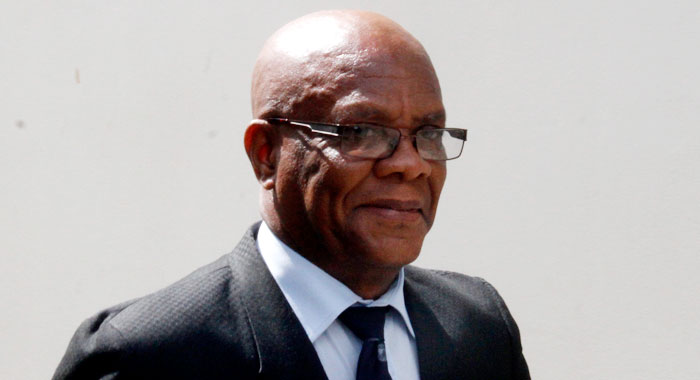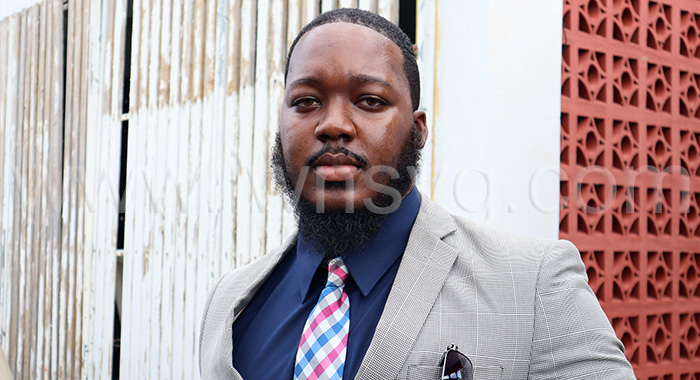The court ruling in the “historic” civil lawsuit brought under the Cybercrime Act — which has no civil jurisdiction — has come under scrutiny, with lawyers saying it should be appealed and not allowed to stand.
Lawyer Adrian Odle brought the case on behalf of his client, Sophie Lawrence, who alleged that her ex-boyfriend, Rayshawne James, had trespassed into her home and accessed her phone illegally after snatching it from her through a window and running away.
When the matter was heard at the Colonarie Magistrate’s Court on Jan. 18 Odle commented that it was the first matter heard before the court under the law that was passed in 2016.
Magistrate Bertie Pompey agreed that that was so.
Odle welcomed the ruling in which Pompey, after a trial heard in James’s absence, ordered that he pay Lawrence EC$6,000 in damages for illegally accessing her phone and EC$100 compensation for trespassing.
However, a lawyer has since expressed to iWitness News concerns about what transpired in court and Odle’s response to issues raised when he spoke about the Cybercrime Act during an interactive radio programme on Jan. 25.
“There is, in fact, no civil jurisdiction under the Cybercrime Act and it is my opinion that the magistrate had no authority to hear the matter as it was brought before him,” the lawyer told iWitness News.
The lawyer said it would be inappropriate, in light of her employment circumstances, to speak about the matter publicly and also because doing so would put the court under scrutiny.
“They were clearly wrong to entertain the ‘claim’,” the lawyer told iWitness News, referring to the court.
“The matter is ripe for appeal and the defendant would win,” the lawyer further stated, adding that if the defendant acted as alleged, his actions should be condemned and the appropriate legal actions taken.
“But justice must be done properly. What he (Odle) has done is have the public think that they can bring a civil action under the Cybercrime Act when they feel violated, when in fact they cannot — not without a fiat (permission) from the Director of Public Prosecution for private prosecution.”
Another lawyer told iWitness News that while the court allows 14 days to appeal a magisterial decision, a party can seek the court’s permission to file an appeal out of time.
The lawyer said the court is likely to hear such an appeal, especially in light of the view that the magistrate’s court did not have jurisdiction in the matter.
Defendant tried in his absence
The civil matter was heard in the absence of the defendant who failed to attend the hearing despite being summoned.
A lawyer noted to iWitness News that this can happen in a civil matter if there is evidence that the person was served notice of the hearing and if there had been a number of adjournments in the matter.
The lawyer said that since the civil suit was purportedly brought under the Cybercrime Act, where the standard and burden of proof and penalty are higher, the court should be satisfied that all reasonable attempts were made to have the person informed of the matter.
Claimant seeks $14,000 in compensation
The statement of claim filed in the matter said that on Sept. 25, 2022, James visited Lawrence’s home in Colonarie without her permission and entered her home.
Odle said Lawrence asked James several times to leave the premises but he refused. James asked to borrow Lawrence’s cellular phone to make a call which she obliged.
James then took Lawrence’s phone and left the residence.
On Sept. 26, James took Lawrence’s phone to the Colonaire Police Station after a police report was made.
However, before doing so, he had transferred to another device personal information from Lawrence’s social media account and photo gallery, such as explicit photos.
As a result, Lawrence sought compensation for trespassing and for illegal access to the cellular phone.
Odle said that by letter dated Nov. 14, 2022, Lawrence demanded compensation in the sum of EC$15,000 but James failed, refused and/or neglected to adhere to the demands or respond.
He said his client suffered loss and damages and asked the court to award EC$14,000 in damages.

‘stop what you are doing’
Lawrence testified in the trial, telling the court that all the data was deleted from the phone.
She said that after she received the phone, James contacted her and she told him, “Rayshawne James, stop what you are doing”.
Lawrence testified that she knew she was speaking with James because he left a voice note.
She told the court that James removed explicit photos of her from her phone and sent them to her.
Lawrence was the only witness to testify in the matter.
After the lawyer presented his case, the magistrate said it was very easy for him to determine as there was no defendant.
He, however, asked Odle to address him on the quantum.
‘I hope that this send a message’
In his submission, Odle said the main reasons why the amount that was being claimed was so high was considering the prevalence of young men illegally accessing the cell phones of females.
“We are in 2024 now but we are also attempting to push the narrative of privacy and this is a great breach of privacy.”
He said that under the Cybercrime Act, the fines for illegal access to any sort of computer system go up to EC$100,000 or more, adding that magistrates’ court can only go up to EC$14,000 and he was seeking that amount for his client.
Odle asked the court to consider the trespass that occurred and the vulnerability of his client as a female.
He said there is “the prevalence of young men who illegally access cell phones of females and doing illegal activities”.
He also asked the court to consider the time when James visited the complainant at her home uninvited, adding that his client was vulnerable as a female.
The magistrate said it was implied throughout Lawrence’s testimony, so he asked if there was a relationship between her and James.
“Not intimate but we had a relationship,” Lawrence responded.
Immediately after the sentencing, Odle welcomed the ruling of the court.
“…I hope that this send a message to those who attempt to illegally access account of others, those who attempt to send around explicit material, that they are not supposed to have in the first place that you are mindful of how you treat others in this new and technological era,” he told iWitness News.
Case comes under media scrutiny
However, the matter came under public scrutiny when Odle appeared as a guest on WE FM’s cop chat on Jan. 25, 2024 to discuss the Cybercrime Act.
He was asked to explain the difference between how the Cybercrime Act can be used in civil and criminal law.
“Well, this is what I would say: this is a general blanket statement. Within the law, we have different remedies that are available for breaches, and you can claim damages for breaches for almost anything. And the damages that you would claim would have to be within the context of what you’re filing.”
In a call to the programme, iWitness News asked Odle to explain the circumstances in which the Cybercrime Act or the laws of St. Vincent and the Grenadines provide for a civil suit to be brought under the Cybercrime Act.
However, Odle did not answer the question, saying his purpose for being on the show was not to discuss the case but to raise awareness about the act.
iWitness News, however, noted to him that he had given an interview to at least one journalist immediately after the court ruling.
Odle, who also lectures in law at the St. Vincent and the Grenadines Community College, said that he had been asked not to discuss the case publicly.
“And I can get into the legal principles, but not with the time that I have left at this moment,” said Odle, who moments earlier had said that he had to leave the show 15 minutes before it was slated to end, something that the host later said he had not told them before.
“So, the blanket statement that I would have made earlier concerning the damages remains the same.
‘No attorney is perfect’
The host said that Odle did request not to discuss the case on the show.
The host further said that many people were sending messages saying that only the DPP has power to prosecute under the Cybercrime Act.
“So, the DPP deals with all the prosecution of crimes, that is their job. But you can file for damages against something that has happened to you. That’s a general legal principle,”
Odle said.
“In a civil matter, you can file for damages. That’s just a blanket statement, not necessarily in relation, to the matter that would have occurred.
When pressed on the matter, Odle said the law evolves, adding, “And as being a lawyer, you can get things incorrect.
“And if it is that there’s an appeal that is being lodged within the courts, then we have to wait and see what the outcome of that may be,” Odle said.
“No attorney is perfect. That is why appeal courts do exist. And if it is that something went wrong, or something was done incorrectly, then the courts will be able to correct that decision.”
However, a lawyer told iWitness News that all of the things that Odle spoke about in his radio appearance are under the criminal jurisdiction of the Cybercrime Act, which does not have a civil jurisdiction that a lawyer cannot prosecute without permission from the DPP.
The lawyer said that the trespass claim is definitely a civil matter.
The Cybercrime Act provides for the court to order compensation to a person who suffers loss of damages because of a commission of an offence under the act.
However, this compensation is in addition to any penalty imposed under the act.
The court may then order the convicted person to pay a fixed sum as compensation to that other person for the loss or damage caused or likely to be caused as a result of the commission of the offence.







When these young lawyers feel that they know everything and like toot their own horns. Humility needs to be taught on law school.
I questioned it from day 1 but he was too busy shining light in his own spotlight. I hope leave to appeal is granted and the verdict reversed based on LAW!
A phone or computer us a personal device, very important things are being stored, taking a person phone and ran means that he already have the taught he gonna do the person dirty, he deserved the fine, he could have transfer all the lady life savings into another account.